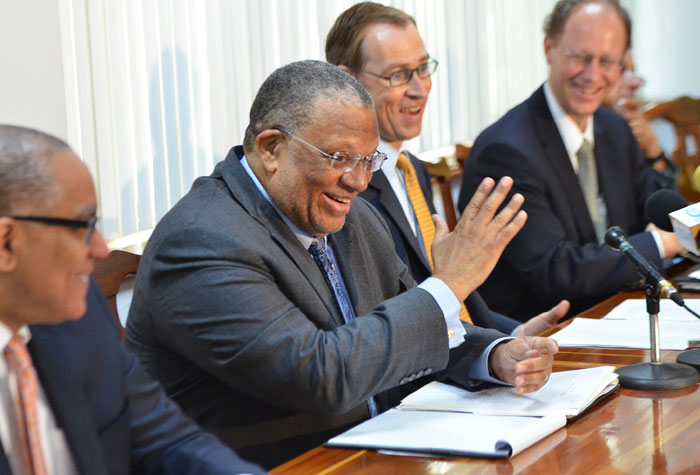IMF Mission Team Satisfied with Implementation of Economic Programme
By: , August 22, 2013The Key Point:
The Facts
- All quantitative performance and indicative targets for the end of June were met
- Growth targets remain “disappointing”
The Full Story
The Government’s efforts in implementing Jamaica’s current economic programme have been deemed “strong” by the International Monetary Fund (IMF) Mission Team, which has concluded the country’s first quarterly review under the new Extended Fund Facility (EFF).
The IMF team, led by Mission Head, Jan Kees Martijn, has been in the island for the past 10 days reviewing Jamaica’s performance, for the April to June quarter, under the US$932.3 million four-year EFF.
They will prepare a staff report for submission to the IMF’s management and, ultimately, the institution’s Executive Board for consideration and approval for the next disbursement of funds to Jamaica.
Details of the review were outlined by Finance and Planning Minister, Dr. the Hon. Peter Phillips, and Mr. Martijn, during a joint media briefing at the Ministry’s offices in Kingston on August 22.
Mr. Martijn informed that having assessed the quarter’s developments, the Mission found that the economic programme’s implementation, thus far, has been “strong” and that the structural reforms “have been progressing.”
“All quantitative performance and indicative targets for the end of June were met, including a floor on social spending. A budget for the current fiscal year in place (is) in line with the targets of the programme, and it is being implemented, as intended. In addition, a number of legislative amendments (which) have been adopted to improve tax administration, and all other (supporting) structural benchmarks, to date, have also been met in a timely manner,” he indicated.
Mr. Martijn said the review, however, found that the economy remains “weak” and that there is still uncertainty, particularly from investors, many of whom “remain to be convinced that this programme will truly take hold.”
He said the growth targets remain “disappointing” and cited statistics pointing to increased unemployment. He said while the latter is attributable to an expanded workforce, rather than increased job losses, it nonetheless is “an important indicator”.
Against this background, Mr. Martijn said the Mission and government have reached “understanding” on a supplementary Memorandum of Economic and Financial Policies, mapping out the way going forward.
Key to this are adoption of fundamental tax reform; strategies to increase growth by improving the business environment and pursuing critical investments; further actions to make the financial system more resilient, with enhanced supervision and phased reforms of the securities dealers sector; and strengthening of the social protection framework. He assured that despite some “technical changes,” no amendments have been made, in principle, to the programme.
“With these staff level understandings on the next steps of the programme, we (can) now move forward. But, I should make it clear that they are subject to approval by the IMF’s Management and Executive Board; and provided that performance remains strong, we foresee that the Board’s consideration of the first review under the Fund arrangement could take place by late September,” Mr. Martijn said.
“Upon approval, about US$30 million would be made available to Jamaica,” he added.
Mr. Martijn expressed gratitude for the extent of co-operation forthcoming from all stakeholders.
Meanwhile, Dr. Phillips said that in addition to senior government officials and technical staff, the IMF representatives also met with private sector representatives and other stakeholders.
He too expressed satisfaction with the performance of the government and its agencies, in fulfilling the programme’s requirements, thus far. The Minister also said he is pleased that the private sector is “beginning to respond to the opportunities created under the programme.”
“We are seeing, for example, an extension in the level of private (sector) credit. We have received reports of welcomed investment activity and expansion in the agricultural sector, in tourism, and among small business elements,” he informed.
The Minister acknowledged that more work needs to be done to fulfill the programme’s objectives of enhancing growth and reducing public debt, and remains confident these can be achieved.
“As confidence builds in the sustainability of the programme, and as greater understanding spreads about the rationale underpinning the programme, we expect many more in the private sector to begin to seek out opportunities to become truly enterprising and reach out for the earning opportunities that are available in this very competitive global and domestic environment,” Dr. Phillips said.

